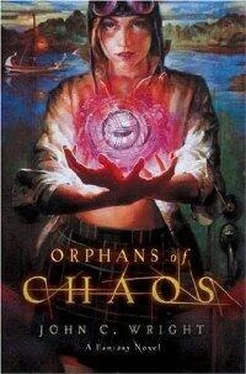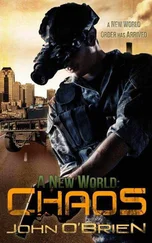“It was the sphere. The hypersphere. And it’s mass, not weight.”
“Why?”
“Mass is an intrinsic property. Weight is a behavior of matter under…”
“No, no. Why was the sphere massive?”
“Oh. Simple geometry. Picture the amount of area covered by a circle. The ratio of the area to the circumference is pi r squared. Rotate the circle on any axis, and the area swept out will be a sphere. The volume of the sphere will be four-thirds pi r cubed. You see?”
“No.”
“Um. If I used a crayon to draw the circumference and another crayon to color in the area, the first crayon would lose a bit and the second a bit more. Use a third crayon to color the surface of a balloon, and a fourth crayon to somehow fill in the entire inner volume of the balloon. The first crayon loses a bit and the second crayon loses a whole lot. Rotate the balloon in the fourth dimension to create a hypervolume. The first crayon fills in the volumes of the six balloons that form its hypersur-face, the second crayon has to fill in a hypervolume raised to the fourth power. You see the difference would be enormous.”
Quentin blinked. “I don’t get it.”
Victor said, “Why six?”
I said to Victor, “Oh! You’re right! There are only six points on the hypersurface where the axis intersects it that form three-spheres. I guess I was confusing the number of right-angled intersections with the Kissing Number, which in the case of 4-D equals 24. I was fooled because I was thinking that if a sphere is all points equidistant from a given point, such that x2+y2+z2=r2, then a four-sphere would satisfy w2+x2+y2+z2=r2 . This implies that for any values where one axis, let’s say w, falls to zero…”
Victor held up his hand. “Now is not the time.” To Quentin, he said, “The four-dimensional sphere is more massive for its volume than a three-dimensional sphere for the same reason that a fishbowl of water is heavier than a pie plate of the same diameter filled shallowly. See?”
Quentin shook his head, “I cannot picture it. I am sorry I was not there to look into this so-called fourth dimension. I had always thought such a thing would be spiritual in nature. I wonder if Amelia—no offense—is merely interpreting things in a geometry metaphor because that is what she understands.”
I laughed aloud. “We’re all doing that.”
Blank stares of incomprehension greeted me. Colin shrugged and passed the champagne bottle around again.
I said, “You’ve never noticed? All the understandable things we each see—tables, chairs, Vanity’s bosom—we each see in the same way. When we see the unknown, however, our brains each interpret it differently. For example, Quentin sees the Hektor-sherrys… ”
“Hecatonchire.”
“…as man impressing vital spirits onto an airy phantasm. I saw it as a multidimensional effect. Colin…?”
“Well, I wasn’t there, but it was obviously psychokinesis. They put their energy into moving the objects. They moved. We just saw Victor here use his PK on the lock to the pastry pantry, didn’t we?”
Victor shook his head. “I moved the interior workings of the lock with magnetic particles. Some organ in my body produces them. You cannot move matter without using matter to push it. Newton’s Laws, remember?”
Colin said, “How did you get such an organ?”
“Amelia’s story makes it clear our captors—and I think that is the correct word to use—consider us to be shape-changers. All that means is that our peoples developed a technology for moving and manipulating cellular and perhaps atomic structures, maybe with molecule-sized tools woven throughout our bodies. So why couldn’t they build organs which had other useful tool properties? Magnetic beams or limbs to manipulate things with? Amelia might have her brain programmed to tag such limbs with cartoon images in her eye, so she can see to manipulate them. What she sees seems not to be made of flesh and blood, she thinks they are in this so-called higher dimension.”
Quentin asked, “But, if that were the case, how could you be manipulating them, these so-called tools, with your thoughts?”
Victor said, “Nothing moves for no reason. If my hand is made of matter and my brain moves my hand, then my brain is made of matter, too.”
Quentin said, “Thoughts? Memories? Love?”
“Chemical reactions in the brain. Epiphenomena.”
Quentin smiled and shook his head. “Matter is material and thought is spiritual. How can it be otherwise?”
Victor pointed at the champagne bottle. “How can drinking affect your thoughts if thoughts are not made of the same substance, not in the same dimension, as Amelia might say, as the champagne? This is just an alcohol. A chemical. Carbon and hydrogen and oxygen atoms in rows.”
“It contains spirits. The blood releases more subtle spirits and humors into the blood. The blood carries it to the pituitary gland…”
Now it was Colin’s turn to join in: “You are both wrong. This champagne bottle is an illusion. It is a belief. You believe it will make you drunk, and you give it your energy. You give it enough energy and it has the power to rob your energy. What happens when a man is drunk? He lacks energy. That’s all. Matter is just an idea, and a bad idea at that. The fact that Victor here can turn locks without touching them and Amelia can walk through walls proves it. If such things are unreal, we only see them because our eyes lack power. Ladies and gentlemen, a toast! To the real world! The one where there are no locks, no walls.”
“Hear, hear!” we all called, raising our glasses.
After the toasting was done, and we were passing around the tub of ice cream we had found, making root beer floats with champagne instead of root beer, Vanity stood up. She had not had as much as the rest of us, but it made her cheeks rosy and her eyes glitter. Her skirt seemed shorter than it had been a moment ago, her neckline lower, her waist thinner. Was that the champagne? Maybe we were shape-changers, and she was feeling prettier, the way I had done when I used to stare in mirrors to turn my mousy hair blond and my brown eyes hazel, then green.
Vanity said, “None of you boys heard a word Amelia said. Not a bloody word. There are different versions of the universe. Different paradigms. Different states of mind. Each paradigm, each model, has something it cannot explain. Something unknown, dark, incomprehensible, irrational. Something it fears. Each philosophy has one question it cannot answer. A different question for each one, but at least one. You see? Chaos. We are from the question mark.”
Colin said, “What do you mean, ‘we,’ White Wench? They said you were one of them. A non-Chaos person. What would you call that? An orderist? An orderly? Neat Freak?”
Quentin said, “The opposite of Chaos is Cosmos. A citizen of the Cosmos is a Cosmopolitan.”
“Oh, God!” said Colin, taking another swig of champagne. “Say it after me. ‘Vanity Fair is a Cosmopolitan.’ ”
Vanity Fair struck a pose, her hands on her knees and her bottom stuck out, her elbows pushing her breasts even more dangerously further forward. “I’m two glamour magazines!”
Victor said, “What is her paradigm?”
I said, “Listen to the way she talks. She is actually a solipsist. She explains everything in terms of different states of mind of the observer.”
Quentin said to me, “How does she explain magic?”
Vanity said, “Magic is what we call the unknown.”
Quentin said to her, “And what do we call it once it is known?”
Vanity shrugged a bit. “The unknown is a blank spot on the map. How different people fill it in is different, I guess. Depends on their tastes, I suppose. Isn’t that what we are all talking about here? Different tastes in the way we choose to see the universe?”
Читать дальше











